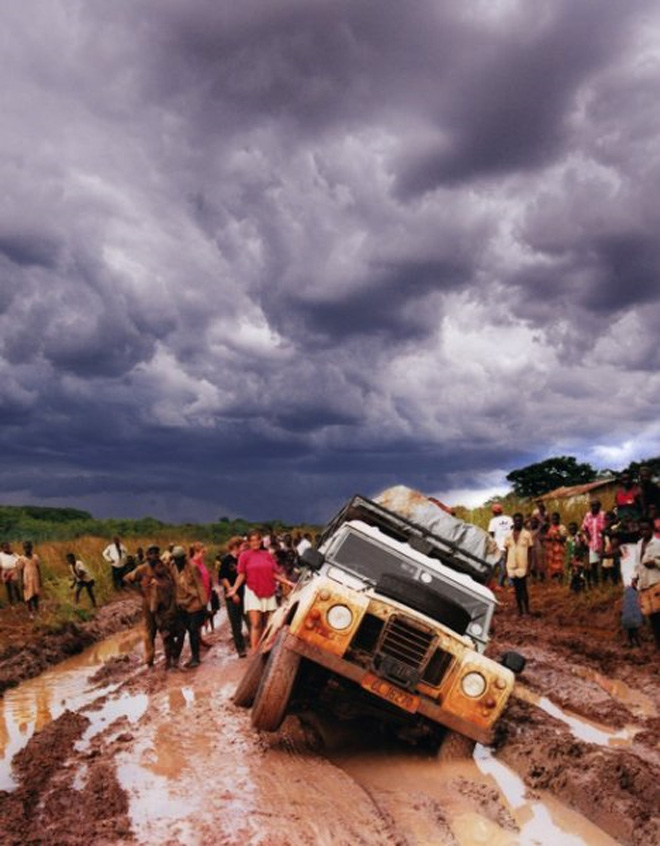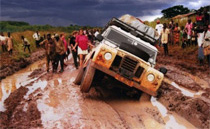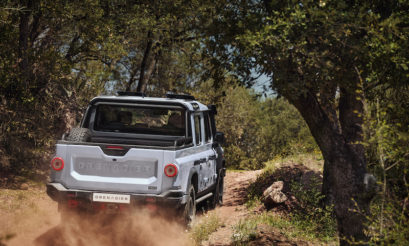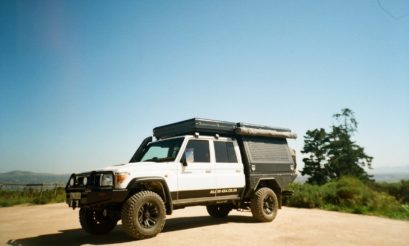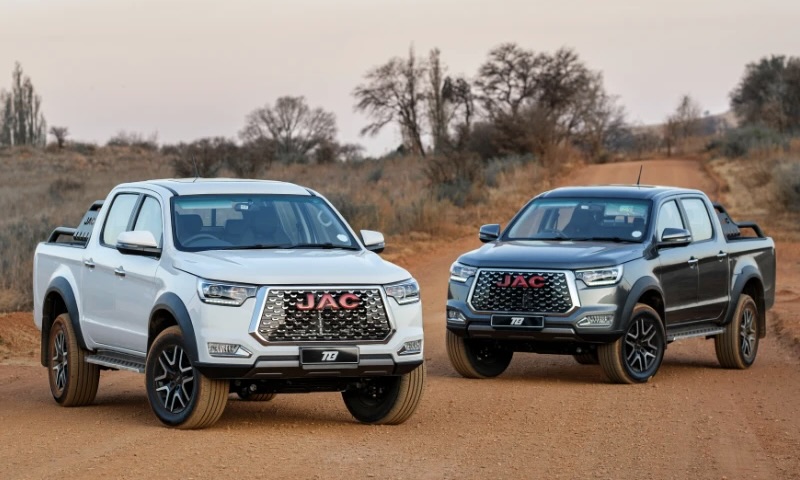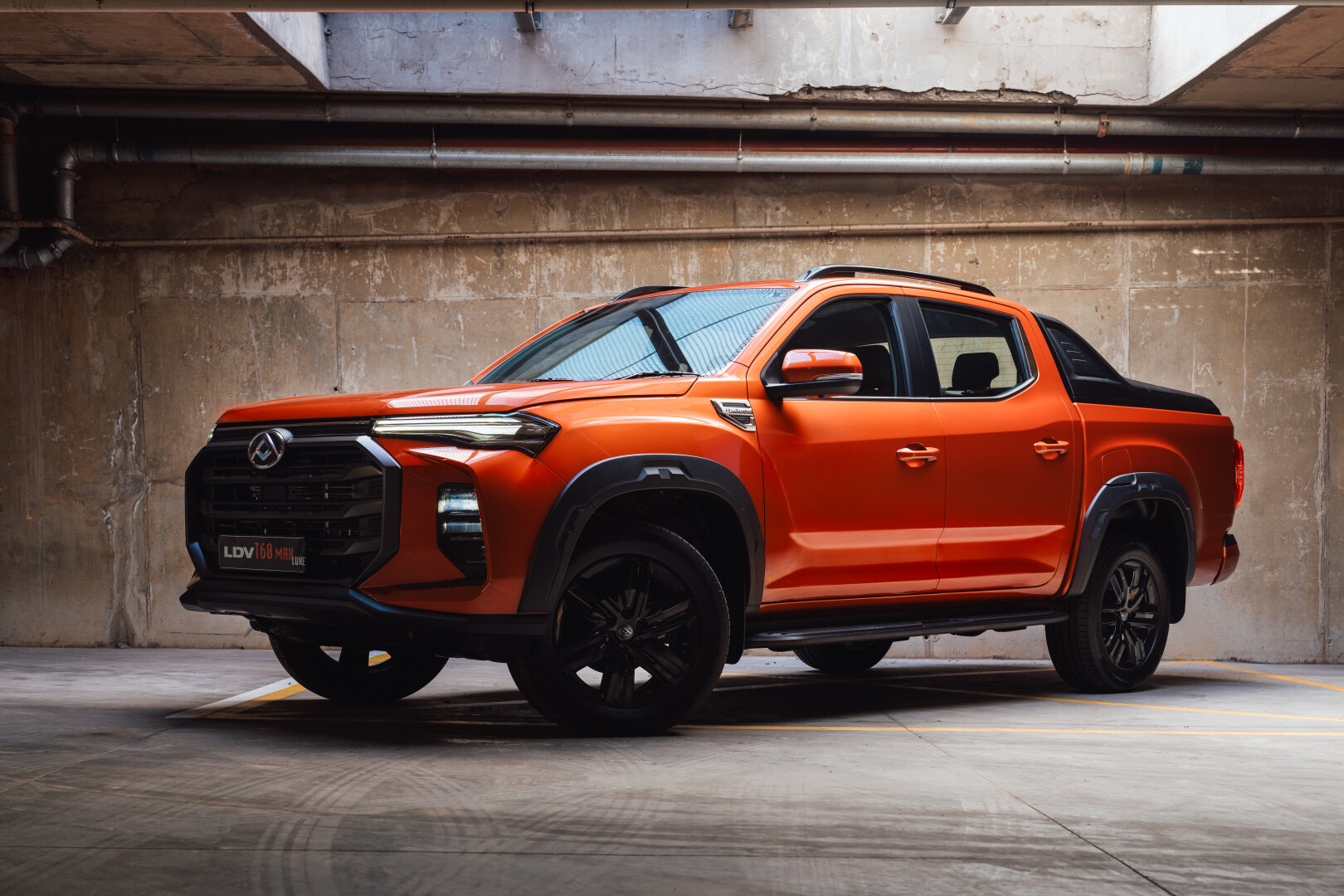Text and photography: Megan Laing
Africa changed me. It opened my eyes.
I was not a rookie traveller when I set foot on the African continent. I had travelled widely since childhood, but Africa was unique.
I come from a small, tranquil country that’s home to four million people. Africa was, well, a very different environment. As we quickly discovered, it is vast, volatile, overpopulated and totally unpredictable.
The thing I loved most about Africa was that we never knew what we were going to face next. The next bend in the road could reveal a herd of elephants, an intimidating police road block, an ancient truck bogged down in a muddy track, or countless other scenarios. It never failed to keep us on our toes! And to be honest, there were good times and bad .We were harassed, swindled and robbed on several occasions, but we also experienced astounding acts of generosity and kindness.
The unpredictable nature of travelling through Africa became clear to us soon after we arrived in Cape Town. After some deliberation, we decided to purchase an old 1972 Land Rover Defender.
Our first game-viewing trip was to Hluhluwe Game Reserve in KwaZulu-Natal. My husband Craig and I were accompanied by two girls we had met in Cape Town and an Australian traveller.
Less than five minutes after entering Hluhluwe, we stopped to see if we could spot any game. Wet sat in silence for a few minutes, but suddenly our Australian companion shouted: “Rhino, rhino!”
A massive rhino was preparing to attack us. Craig floored the accelerator. We lurched forward just as this great beast was lowering its head to charge at us. I turned to see his horn miss the back of our truck by a few centimetres. But the rhino wasn’t done. He then chased us up the road to make sure we had got the message.
It was an exciting way to begin our big African adventure, and we all agreed that nothing like that could ever happen where we came from. A sheep running across the road is about as scary as things get in New Zealand!
From that moment on, our Land Rover was known as The White Rhino.
The four-wheeled Rhino was a gutsy old vehicle, and Craig – who is an excellent mechanic – managed to fix her time and again with a few basic tools. We managed to crash and bash, shudder and shake our way over 30 000km and visited 12 countries in an eight-month period. Flat tyres and broken engine mounts were regular problems (the four-litre Chevrolet engine was apparently too heavy for the mounts). Of course, the horrendous, rocky tracks encountered throughout the continent only exacerbated the problem.
Our first real experience of a less-developed African country was Mozambique. After South Africa, Mozambique was quite a shock, but still offered an enjoyable experience.
From Mozambique, we travelled to Malawi, and spent a few wonderful weeks on Lake Malawi’s shores.
Once we had travelled through Malawi, we found ourselves at a crossroads. Should we do the sensible thing, we asked, and head east as most tourists apparently did? Or should we set our sights on Uganda?
Although we were told by countless people that the roads leading west were simply too horrific, we decided to go for it anyway. Craig couldn’t say no to the challenge. And after all, how bad could it really be?
Well, as it turned out, it could be very bad! We were travelling without a map and there were absolutely no signposts. Predictably, we got horribly lost on many occasions. On one particular day, we broke down in the middle of nowhere and couldn’t get the vehicle going again. It was a frightening experience, but luckily a Red Cross vehicle found us and took us to a nearby village.
With our vehicle finally repaired, we continued on towards Uganda. Eventually, however, we ran into a serious problem. A bridge ahead of us had been washed away and there was no way we could continue on that route. We had to turn around.
Out of options, we decided to enter Rwanda. We didn’t know what to expect. Everything we knew about Rwanda we had gleaned from news coverage of the country’s 1994 genocide.
We entered Rwanda fearfully, but found a surprisingly peaceful country. In fact, this is true of most African countries. Sure, we had a few alarming experiences, but we seldom felt threatened (though I must admit there were one or two occasions when I truly feared for our lives).
Eventually, we made it through to Uganda and Kenya with our Land Rover as battered and bruised as our team. We discovered that we couldn’t really go much farther, because the countries to the north were embroiled in conflict, and bandit activity made it dangerous for tourists.
We faced another concern as well: we were running out of money. We weren’t left with any option but to turn around and head south. Also, Craig was getting to the point in our “holiday” where he thought he might as well be earning an income for all the hard and filthy work he was doing! Being our mechanic was a full-time job.
We travelled in a figure-of-eight route back to Cape Town and sold our Land Rover to a young British couple. Watching our trust Landy drive off was a tough moment. Sure, it had been temperamental, but it had carried us through. Despite all the harrowing obstacles it had been forced to face, it survived. And it had allowed us to explore the mesmerising African continent. Riding the Rhino really had been a life-changing experience!
WANT TO READ MORE?
Megan has written a 400-page book on her African adventure titled Riding the Rhino. If you’d like to get hold of a copy, visit www.publishme.co.nz, and click on the “Publish Me Shop” box.
Below is an extract from Riding the Rhino:
After reaching the junction at Lusahanga, we continued north-west before halting at a small town called Benako, which was close to the Rwandan border. At Benako, a group of policemen beside the road instructed us to pull over.
“You must go to the police camp and get an escort,” a policeman told our anxious crew. “It is 137km from Benako to Karagwe. There are bandits around.”
At the police station, we waited outside for 15 minutes before being assigned an officer, called Alfred. Armed with an AK47 slung over his shoulder, Alfred gave us a fleeting glance before jumping into the front seat of a truck that was leaving at the same time. For the next half-an-hour, the truck made innumerable stops to pick up and drop off passengers. Not only did we find all the stopping and starting annoying, but Alfred constantly changed his mind as to whether he wanted us to lead or follow. Every so often we would see his arm waving out of the passenger window in the truck, indicating for us to pass. The truck would stop soon afterwards, then Alfred would signal for us to fall in behind.
Eventually, we reached a police checkpoint, where Alfred left the truck and, without a word, climbed into the front seat of our Land Rover. Communication was difficult but, through repetition and charades, we got the answer to a couple of questions we wanted to know.
“Do you shoot bandits with your gun?” Craig asked Alfred, while pointing to his rifle.
Alfred nodded.
“How many people do you shoot in a week?” queried Craig.
Alfred held up two fingers. For the first time in Africa, I felt afraid for our personal safety.
The road was narrow and bumpy. The long grass on each side was perfect camouflage for gun-wielding guerrillas, but worst of all were the ominous black clouds overhead that soon delivered a gushing downpour. The road was instantly transformed into a river. Great waves of water washed over the bonnet of our pummelled Land Rover and, before long, the engine gave a cough before going on strike. It was obviously a case of every man for himself, as we saw the truck drive off into the distance.
Under the heavy downpour stood a nervous-looking Alfred, whose eyes darted around in every direction. My job was to hold the umbrella above Craig’s head as he worked on the engine. We were instantly soaked to the skin.
With water all around, we felt like sitting ducks. Craig had to dry out the electrical components with our towels. After 45 minutes, I felt like crying with relief when the Land Rover finally started. Craig placed a refuse bag over the offending leads and secured it with a rubber band in an attempt to avoid the situation happening again.
